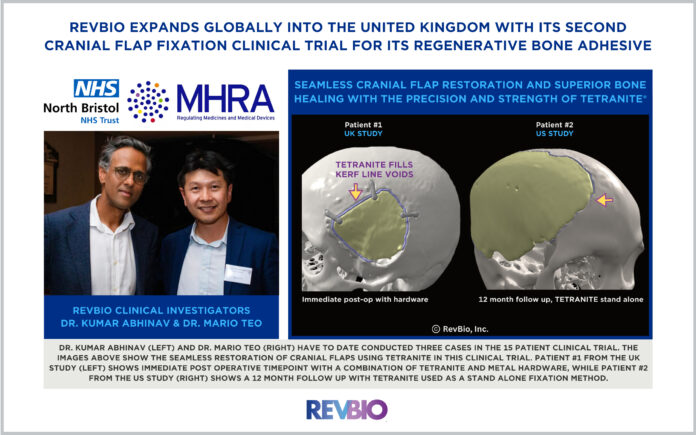
Lowell, Mass.– RevBio, Inc. has expanded its international presence with the launch of a new clinical trial in the United Kingdom to test its regenerative bone adhesive, TETRANITE®, for use in cranial flap fixation. The pilot study, approved by the UK’s Medicines and Healthcare products Regulatory Agency (MHRA), is being conducted at North Bristol NHS Trust and marks the company’s second cranial flap fixation trial following its ongoing research in the United States.
The trial will enroll 15 patients undergoing craniotomy procedures, where portions of the skull are temporarily removed to access the brain. The study aims to demonstrate that TETRANITE can reintegrate these bone flaps with surrounding bone, improving both cosmetic outcomes and patient comfort while reducing the risk of cerebrospinal fluid leaks—a complication that can cause significant pain and lead to infection.
Dr. Mario Teo and Dr. Kumar Abhinav, both neurosurgeons at North Bristol NHS Trust, are leading the study. So far, three patients have been enrolled in the initial phase. The first five patients in the trial will receive TETRANITE alongside traditional metal plates and screws to evaluate the adhesive’s ability to promote bone regeneration in the kerf space—the gap created when the cranial flap is cut. This area typically remains unfilled and does not regenerate naturally.
The remaining ten patients will receive TETRANITE as a stand-alone solution, mirroring the design of the ongoing U.S. trial, which has already enrolled 18 of 20 planned patients. According to RevBio, none of the U.S. trial participants have experienced device-related complications, with many now monitored for over six months.
Dr. Teo described the early results as encouraging, saying, “The background scientific work coupled with the promising recruitment thus far indicates that TETRANITE could play an important and exciting role in the future of craniotomy procedures.”
Dr. Abhinav noted the potential of TETRANITE to streamline cranial reconstruction. “Based on our initial cases, we believe TETRANITE could obviate the need for plates and screws for cranial fixation,” he said. “This product could provide patients with a much more rapid, mechanically robust solution which would lead to more optimal cosmetic outcomes.”
North Bristol NHS Trust has a long-standing reputation for excellence in neurosurgery, tracing its roots back to World War II when it served as a key treatment center for soldiers with traumatic brain and spinal injuries. The department continues to serve as a regional center of excellence, drawing neurosurgeons from around the world for advanced training.
With this latest international expansion, RevBio continues to build momentum in advancing biomaterials that support bone regeneration and improve surgical outcomes. The company’s efforts are aimed at setting a new standard in cranial reconstruction and potentially reducing the need for metal hardware in future procedures.

